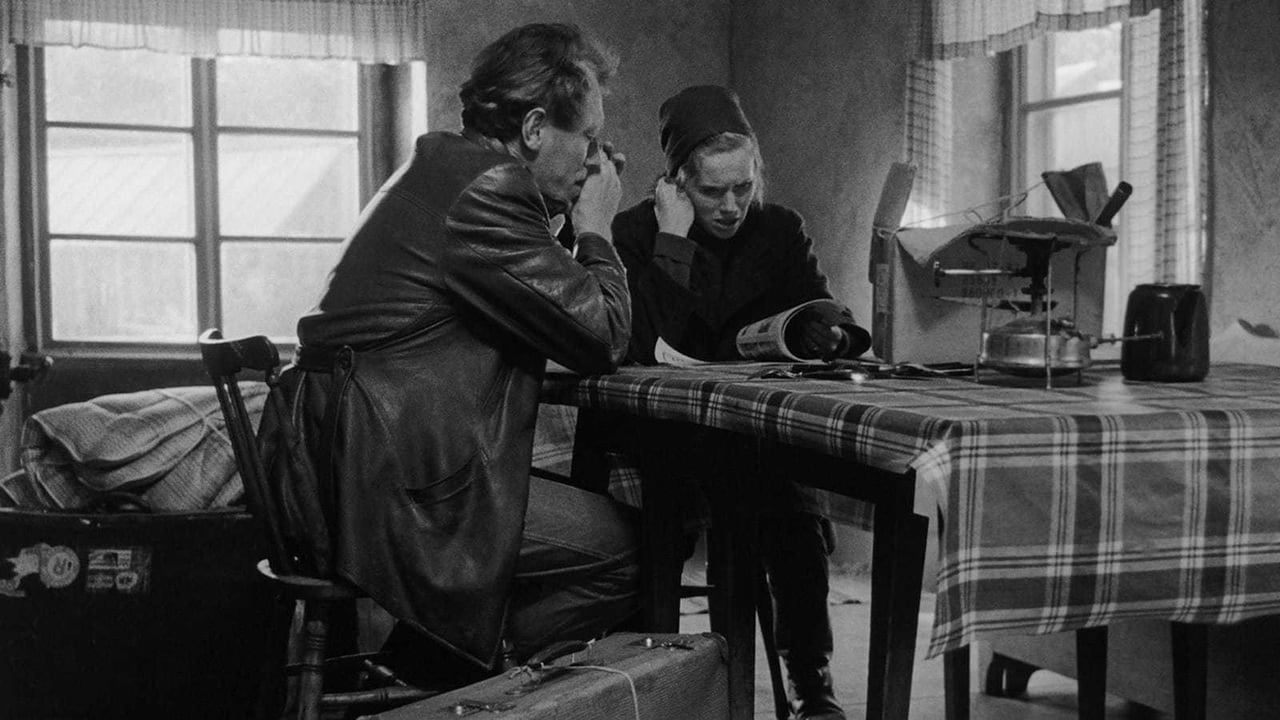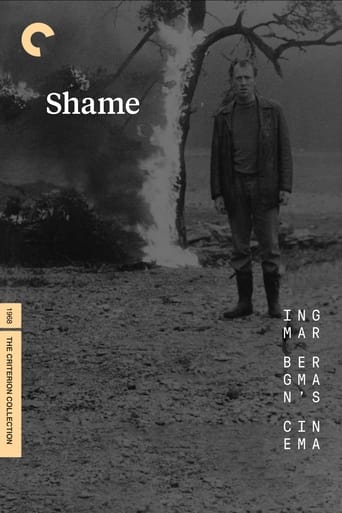gavin6942
Ingmar Bergman's psychological study of how humans react in a situation of war. The film takes place on Gotland, where invasion forces arrive.Pauline Kael reviewed the film in December 1968, writing, "Shame is a masterpiece, – a vision of the effect of war on two people, – but – it has many characters and incidents – in many ways, (it is) Bergman's equivalent of Godard's Week End – also an account of what people do to survive – Liv Ullmann is superb in the demanding central role, – Gunnar Björnstrand is beautifully restrained as an aging man clinging to the wreckage of his life. The subject is our responses to death, but a work of art is a true sign of life." Bergman is always great, at least in the black and white era. I'm less a fan of his color films. But when you have that crisp, bleak back and white cinematography and Max von Sydow, you can do no wrong.
EvangelionManFromTheOtherSide
I don't think I've ever struggled so much on how I should like or dislike a film. I'm going to briefly jump to conclusions and say that Ingmar Bergman's Shame is absolutely brilliant, yet far from being his best. Contrary to what Bergman himself said about this movie, I thought the first half was fantastic, I didn't find it uneven at all. Although the latter half was no less uneven, I found certain points to be dragging in nature. Still, Shame, for me, was a powerful experience, with lots of perfections on many levels.Released in the same year as Hour of the Wolf, along with the same leads, Shame is a character study of people caught in a raging civil war. Despite the epic scale of the film, it is very, very bleak; so far the most bleakest Bergman movie I've seen. In fact, this can be seen in the first scene alone that shows the two main characters, Eva (Ullman) and Jan (Sydow), simply waking up to a loud alarm clock to start the day. The one oddity that occurs in the scene is when we briefly see Eva topless.We can understand that Eva and Jan are heavily pressurized by the effects of the war; Jan's dream about returning to his profession of music and a later scene where Eva scolds Jan for crying like a child show us their hopes are deterred by the war. Interestingly, Eva's intolerance with Jan's behavior is quite the very opposite of what was shown in Hour of the Wolf: Ullman tolerates what Sydow's character is going through.The variety of encounters the couple have on their way and in town tell us a lot about the characters' anxieties. Jan's irritation of himself for not being thoughtful and accomplished enough is evidenced in the scene where Eva talks to Filip, the kind guy who gives them the fish and tells of them some news regarding the war. His not being able to fix things, such as the radio (the only telecommunication device available) shows how Jan is limited beyond his apparent talent in music.The part where Eva and Jan visits the wine salesman was quite thought-provoking. The salesman, despite his age, is called to duty, and he shares his fear of being forgotten when he dies. In this scene, we're shown shots of the room that depicts old statue pieces and whatnot. The sets decoration of the room they're in resembles the theatrical nature of Bergman's pre-(and post)-60s works, which the director seems to have moved on at that point in life. I don't if this has anything to do with the shots that showed the "souless" nature of the old room, but it's my theory. The scene itself could also mean the nothingness people will eventually become, as explored in The Silence.There many ravishing scenes during the war scenes and its aftermath. The explosions are shot perfectly, despite very little of it is shown (and to think explosions were the last thing we would see in a Bergman film). The moment where Eva sees the lifeless body of a baby child was stunningly captured. Her sadness and Jan's lack of compassion over its death show the difference in their nature, and how those traits influence the way they change later in the film.The political backdrop of the film is questionable, as Shame is more a study on the characters than being a story about surviving a war. Regardless, I think Bergman intended to have some commentary on the Vietnam War, or maybe war in general, in the movie. The interview scene is a prime example of how Bergman felt about dirty politics. Eva is forced to do an interview by enemy soldiers, to which she answers honestly. Later, the questioned by friend soldiers about the interview, which has been made into a propaganda. Bergman, as we all know, was a fan of Tarkovsky, and if he actually did intend to a political message in the film, then I think he was doing what Tarkovsky did with Andrei Rublev: how art can be destroyed by hypocrisy.Gunnar Björnstrand gives one of his finest performances as the ruthless, yet lonely, Col. Jacobi. His scene-stealing role was an aspect of good and bad for me. The convoluted relationship that he develops between Eva and Jan influence their eventual development, but at times, I feel the plot becomes too delved into this. Not that there's anything wrong with introducing this sub-plot.Eva and Jan's major transformations occur when the latter has Jacobi killed. Throughout the film, Jan has been berated for not being man enough while Eva had a lot of influence over Jan. Jan, because of his weak and cowardly nature, has Jacobi, the man who has been stealing his wife, killed in a dirty maneuver. Meanwhile, Eva retains her sympathetic nature while losing control of her husband. This becomes much evident in the next scenes where Jan kills a young soldier by stealing his gun while the latter is asleep, with Eva helplessly crying for Jan to stop. The sudden transition in characters may be a bit hard to swallow, but I think it's still executed in an appropriate way.All in all, I hesitate to call Bergman's Shame a masterpiece, containing some flaws I find hard to ignore. Nevertheless, there's still so much greatness that I can't give enough praise. The writing is splendid, with Bergman having done a fine job in characterization. Ulman and Sydow are great again; Sydow gave the better performance in Hour of the Wolf while it was vice versa for Shame. Even if you're not too much a fan of Bergman, this overlooked piece of work can be enjoyed as a superb war film that can leave you thinking hours, maybe days, after watching.
zolaaar
Extremely pinching vision of a war situation where the couple from Vargtimmen (ok, they have different names and initial situations, but the actors are the same) gets caught in the crossfire of two fronts. The depiction of the fighting parties as faceless, superordinate authorities are often captured in sublime surreal pictures and draws interesting parallels to Orwell's 1984, even if Bergman thwarts this context on a personal level of a slowly burgeoning conjugal war. That is why countless fundamental and philosophical questions towards Eva's and Jan's marriage are relevant and essential, while the threat and danger from the outside tears open an abyss in the inside which was toilsomely covered with lambencies before. An intense allegory on the fragile facades of civic conventions.

